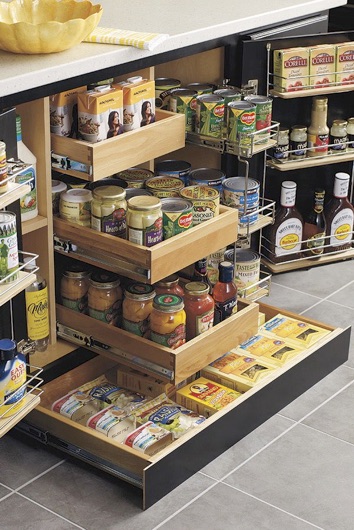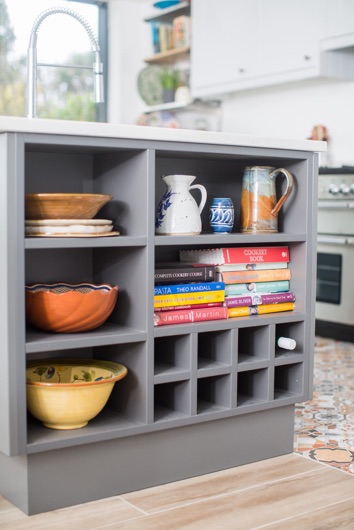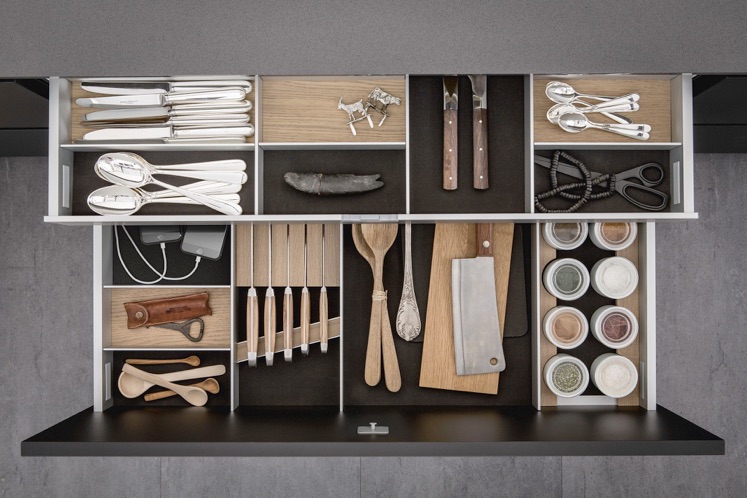the big little kitchen | Think Small, Live Large


In order to maintain any sort of equilibrium between your space and the stuff you want to store in it, you should commit to a regular routine of prioritizing, purging and plain old pickiness. The smaller the kitchen the trickier this space versus stuff balancing act becomes and the higher the degree of discipline—and pickiness—that will be required. If you already live with a small kitchen you probably know this, at least subliminally, even if you still resist accepting it. With a new kitchen this should become top of mind, so you can integrate your priorities into your plans. All of this may feel like yet another irksome form of deprivation, but it helps to view it instead as an expression of your highly cultivated sense of discrimination. Think to yourself: Simplicity and selectivity are good; they reflect my highly developed sense of discernment, mindfulness and good taste. Clutter, confusion and over-crowding are not good; they’re signs of a sloppy, self-indulgent mind. You get the idea. Think of it as tough love for the acquisitive, lazy child within us all.
Organization:
The one, irrefutable fact of life in every kitchen is that all the things you want to store in it must fit in the space you have to store them. In a small kitchen this fact will constantly frustrate your dearest design ideas and challenge your creativity. And, as much as you would like to believe otherwise, there’s no wiggle room on this. The laws of physics will always apply: Two kitchen objects cannot occupy the same space at the same time. Yes, you might want to keep your entire collection of spices featuring seven varieties of thyme from five continents, but you can only do that if you create space by giving up several of the twenty-five types of herbal tea you like to keep on hand, cutting back on your collection of Le Creuset—or Great Jones— cookware in every available size and color, and perhaps settling for just a single, single-malt Scotch.
“A place for everything, and everything in its place,” may sound like a tired old maxim, but it still represents the very essence of good kitchen management and following it will help to make your life far easier.
For starters, if you’re being picky and have a truly small kitchen you should probably avoid buying, or even think about buying, any of the slew of specialized appliances being pitched at us constantly, no matter how much you feel you "need" them. This is especially true of things that have only a single purpose or whose function can easily be performed by the standard equipment you already own. That top-of-the-line slow cooker, the countertop electric egg cooker or hamburger grill, the artisanal bread maker that you use only once a year, the state-of-the-art espresso maker with micro-foam function you know you would use trot out to impress the company, or that expensive imported Italian pasta machine (and the list goes on) are all going to use up a disproportionate amount of space in a small kitchen that will far outweigh their usefulness and, in the zero-sum game that is small kitchen planning, should probably remain unrealized dreams. If you already own any think seriously about giving them away—unless one of these things is something you really do use on a regular basis, i.e., at least monthly, and have a proven need for. Lots of great cooks have never touched any of these often over-priced, space-greedy appliances and they are still great cooks. They have learned how to make a handful of useful appliances and utensils function in several different ways. A really good home cook does not need a special gadget to cook a pork butt, or knead dough, or stir batter.
Likewise your choice of foods, and the varieties, quantities and sizes in which you buy them will have to be equally well-considered. It is especially important for you to start being zealously honest and realistic about if and when you're likely to use a particular ingredient or product and how much of it you might actually need to keep on hand. This will go a long way toward keeping you and your kitchen on friendly terms. Also, try to stifle the master-chef fantasy which has you sitting in the foodie version of mission control, otherwise known as your tiny kitchen, with every conceivable ingredient at your finger-tips ready to add to your next great culinary creation. Your next great culinary creation can wait long enough for you to plan and shop for ingredients on an as-needed basis. Above all, when you go to Costco, stick to the nice little gourmet selections they have that you know you will actually use, and avoid the Army-sized quantities of food stuffs and dry goods they package up so appealingly.
Assuming that your self discipline about acquiring stuff is already well developed and you have begun to scale down on the number and variety of things you try to keep in your kitchen, that is, you have cut back on the size of your wine cellar or moved it to the basement, where it actually belongs (that's why its called a "cellar"), have cancelled your subscription to the pasta-of-the-month club, have cut back on the never-ending supply of single-use gadgets that the late-night shills on TV are so good at selling (or better yet, you have stopped watching them altogether), and have stopped reading the William-Sonoma catalog, then the next step is to amp up the capacity and efficiency of the space you do have available. This will mean shopping less, organizing more and trying to integrate that sense of balance into every aspect of your kitchen routine. In the end you will hopefully discover, as many have, that the discriminating and intelligent creativity involved in this process will become its own reward and you will start to see your small kitchen as the well-spring of good food and good times it is and not as a battleground between your space and your stuff.


Choosing a cabinet plan with an abundance of super-efficient storage and improvising whatever creative add-ons you can come up with, will help you to maximize the capacity of your small kitchen and make the ongoing balancing act of keeping it organized a good deal simpler.



This is what your soon-to-be balanced and well-organized kitchen can look like. There are only as much food and equipment as the space allows, and no clutter. Isn’t it pretty?
Above all else, a well-ordered kitchen is not just nicer to look at — it is a joy to use. Maintaining balance lets you put your energy into your love of cooking and not into the struggle to store, find and put away the many things you need to pursue that love.
The Space/Thyme Continuum
The Secret to Finding Balance in Your Kitchen and Your Life




